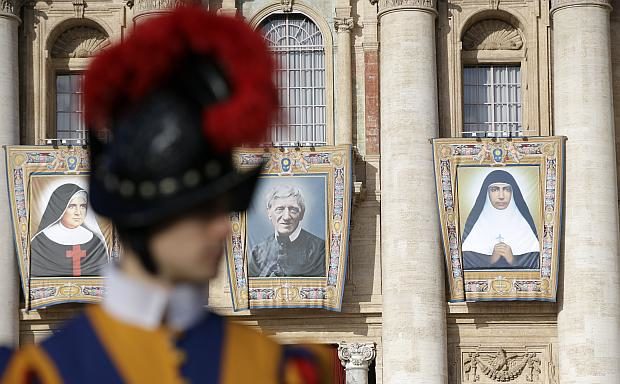Pope canonizes John Henry Newman, unifier in a divided world

Tapestries hanging from the facade of St. Peter’s Basilica portray from left, Giuseppina Vannini, John Henry Newman and Maria Teresa Chiramel Mankidiyan, in St. Peter’s Square at the Vatican, Sunday, Oct. 13, 2019. Pope Francis canonizes Newman, the 19th century Anglican convert who became an immensely influential thinker in both Anglican and Catholic churches, and four women. (Photo by Alessandra Tarantino / AP)
VATICAN CITY — Pope Francis on Sunday canonized Cardinal John Henry Newman, the 19th-century Anglican convert who became an immensely influential, unifying figure in both the Anglican and Catholic churches.
Francis presided over Mass on Sunday in a packed St. Peter’s Square to declare Newman and four women saints.
Among the luminaries on hand was Prince Charles, heir to the British throne, who penned a remarkable ode to Newman that was published in the Vatican newspaper, L’Osservatore Romano.
Newman, a theologian, poet is admired by Catholics and Anglicans alike because he followed his conscience at great personal cost. When he defected from the Church of England to the Catholic Church in 1845, he lost friends, work and even family ties, believing the truth he was searching for could only be found in the Catholic faith.
Anglicans split from Rome in 1534 when English King Henry VIII was refused a marriage annulment. In the centuries that followed, Catholics in Britain were fined, discriminated against and killed for their faith.
Article continues after this advertisementIn his editorial, Charles said that Newman’s fearless, honest example was needed today in an era marked by division and intolerance “for the manner in which, at his best, he could advocate without accusation, could disagree without disrespect and, perhaps most of all, could see differences as places of encounter rather than exclusion.”
Article continues after this advertisementNewman was one of the founders of the so-called Oxford Movement of the 1830s, which sought to revive certain Roman Catholic doctrines in the Church of England by looking back to the traditions of the earliest Christian church.
But he gave up a brilliant academic career at Oxford University and the pulpit of the university church to convert to Catholicism in 1845. As a Catholic, he became one of the most influential theologians of the era, bringing elements of the Anglican church into his new faith tradition.
Yet Newman’s legacy is complex for Anglicans and Catholics alike: Liberals like his emphasis on conscience, conservatives admire his submission to authority and his devotion to celibacy.
Some gay activists have claimed him as one of their own, as Newman was buried in the same grave as the Rev. Ambrose St. John, his companion of more than 30 years.
On the eve of his canonization, one of the Vatican’s most senior English-speaking officials, Canadian Cardinal Marc Ouellet, declared that Newman should be made a doctor of the church to honor the tremendous influence his writings had on the development of Christian doctrine.
Ouellet choked up as he delivered a speech on Newman and his role in bridging the theological gaps between the Anglican and Catholic traditions.
/atm